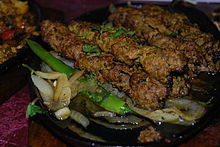Seekh kebab
 Seekh kebabs served on a plate. | |
| Course | Main course |
|---|---|
| Place of origin | Indian subcontinent[1][2] |
| Region or state | Indian subcontinent |
| Associated cuisine | Bangladesh, India, Pakistan |
| Serving temperature | Hot |
| Main ingredients | Indian spices, spiced minced or ground meat, usually lamb, beef, or chicken |
Seekh kebab is a type of kebab, native to the Indian subcontinent,[2][1] made with Indian spices, spiced minced or ground meat, usually lamb, beef, or chicken, formed into cylinders on skewers and grilled.[3][4] It is typically cooked on a mangal or barbecue, or in a tandoor. Seekh kebabs are prepared in homes and restaurants throughout South Asia. It is a signature dish in Indian metro cities like Bhopal, Delhi, Hyderabad, and Lucknow and in Pakistan specifically in Karachi, .[1][2]
Description
[edit]
Seekh kebabs are soft and succulent, seasoned with various spices such as ginger, garlic, green chilli pepper, powdered chilli and garam masala, as well as lemon juice, coriander/cilantro and mint leaves. Sometimes extra fats are added to further enhance the flavor. Seekh kebabs are typically served with raita, salad, onion slices, lemon wedges or green chutney and eaten with naan breads or parathas.[1][2]
Some popular seekh kebabs variants are gola kabab, tunde ke kabab, kakori kebab and gilafi seekh kebab. Vegetarian seekh kebabs popular in India are made with beans, carrots, potatoes, cauliflowers and green peas.
See also
[edit]References
[edit]- ^ a b c d S. N. M. Khan (1947). The finest Indian Muslim cooking. M. Ashraf.
- ^ a b c d Steven Raichlen (1 November 2011). The Barbecue! Bible. Workman Publishing Company, Incorporated. pp. 246–. ISBN 978-0-7611-7042-6.
- ^ Albala, Ken, ed. (2011). Food cultures of the world encyclopedia. Santa Barbara, Calif.: Greenwood. ISBN 9780313376276. OCLC 727739841.
- ^ Mohiuddin, Yasmeen Niaz (2007). Pakistan: A Global Studies Handbook. ABC-CLIO. p. 325. ISBN 978-1-85109-801-9 – via Google Books.

